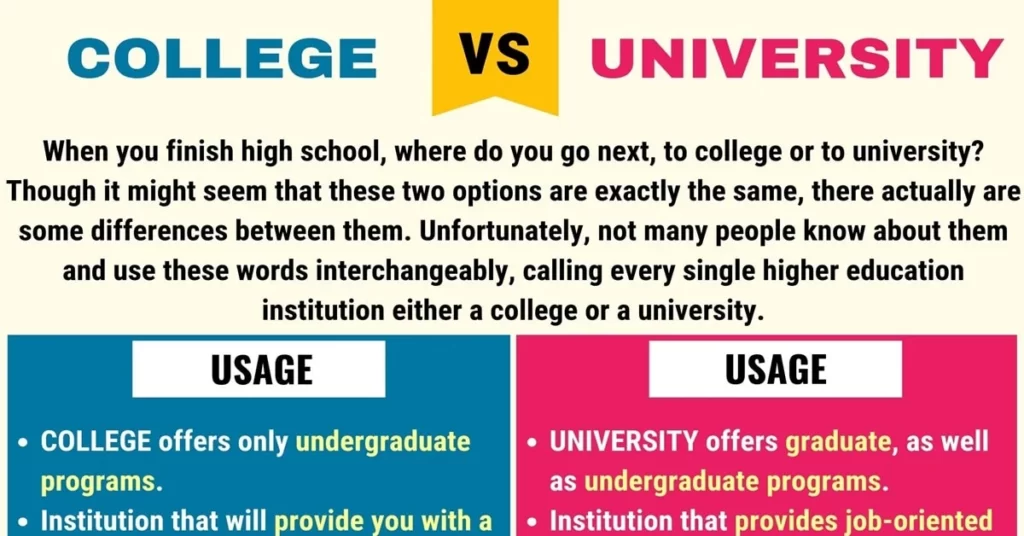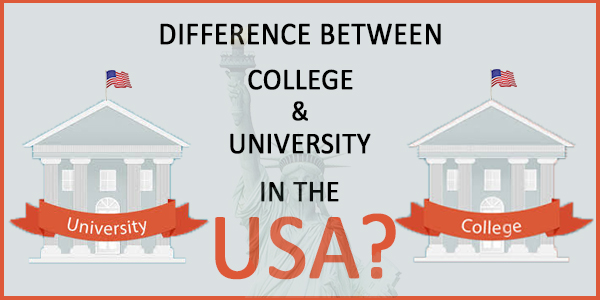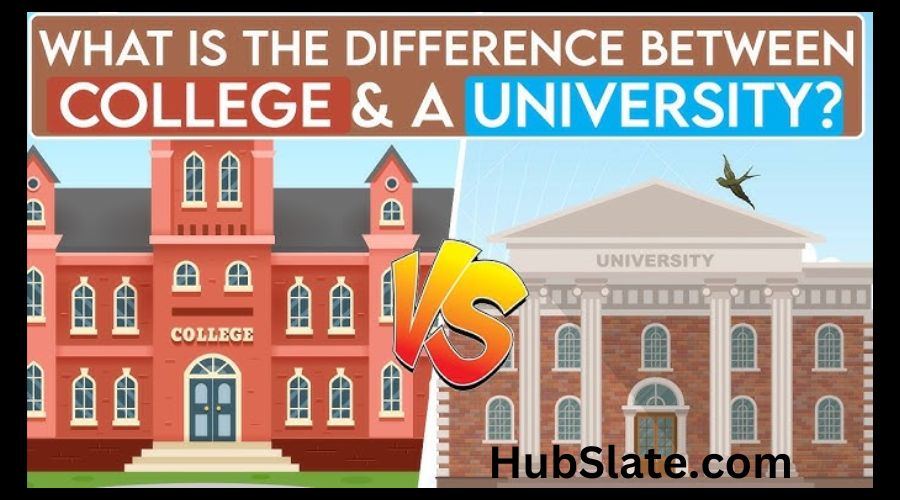Starting college or university is like beginning a new chapter in learning. People sometimes use the words “college” and “university” when they talk, and it might seem like they mean the same thing.
But when we look closer, we see that in school, these words are quite different. Let’s take a simple look and understand what makes a college different from a university. In some places, schools are called colleges, and some are called universities.
But what’s the difference between a college and a university? This article will explain what it means for a school to be a college or a university and help you figure out which one might be better for you.
Diffrence Between Collage and Universities

What Is a College?
In the United States, we often say “college” when we talk about higher education. We don’t usually say someone is a “university student” or has a “university degree.” But there’s a real difference between a college and a university.
The biggest difference is how big they are. It’s not about the size of the campus but the type of degrees they focus on. A two-year college usually offers associate’s degrees, and a four-year college usually offers bachelor’s degrees. Colleges usually don’t have graduate programs, but there are exceptions!
Since colleges focus more on one type of degree, they often have smaller classes. That means students get more attention from teachers and advisors. Colleges are mostly about teaching undergraduates and not so much about doing research. But some colleges still do a lot of research.
Colleges also tend to be more about specific subjects. They might not teach as many abstract or theoretical things, and they might not focus as much on independent research.
Some colleges are specialized because they have fewer students. For example, there are liberal arts colleges or ones that focus only on engineering. Most colleges are private, which means they aren’t funded by the government. Many have religious connections or teach a special curriculum.
For instance, some colleges follow a “Great Books” curriculum, where students read and understand essential books in Western culture. A few colleges, like Thomas Aquinas College and Shimer College, focus on studying these works.
Colleges with special focuses, like military academies or graphic design schools, don’t need to offer a lot of different things because the students who apply already like what the school is all about.
Most colleges only offer undergraduate degrees and usually have fewer programs than universities. Colleges have departments for different subjects, while universities may have separate schools for different majors.
Some colleges also offer graduate and professional degrees, like:
- The College of William and Mary in Virginia, which offers graduate degrees in arts and sciences, business, law, education, and marine science.
- Dartmouth College in New Hampshire, which offers graduate degrees in medicine, business, engineering, computer science, and more.
- St. Joseph’s College in New York, which offers graduate degrees in education, business, creative writing, and more.
Sometimes, colleges that offer graduate degrees keep the name “college” because it’s traditional. They started as only undergraduate schools but later added graduate programs. People who went there might not want the name to change.
There’s also a rare situation where some colleges are technically universities but can’t change their names. For example, Boston College is a university by definition, but it can’t become Boston University because that’s already a different school.
Advantages and Disadvantages of Colleges
Let’s explore some good and not-so-good things about colleges. This list can help you understand the positives and negatives:
Advantages (Pros):
- You might get more attention from teachers and advisors, making it easier for you to learn.
- Colleges often pay more attention to teaching students at the basic level.
- Colleges can focus on specific subjects that you might really like.
- Most colleges have a close-knit community of students who support each other.
Disadvantages (Cons):
- Colleges might not have as many resources and places for doing research.
- Teachers at colleges might not be the top experts in their fields.
- Colleges don’t offer direct ways to get more advanced degrees.
- Colleges usually don’t have as many different programs for you to choose from.
What Is a University?
Universities are big schools that offer both basic and advanced degrees. When you finish basic courses, you can continue learning and get a master’s or a PhD at a university.
Some universities also have special schools for law, medicine, or business. In certain cases, students at universities can earn a bachelor’s and a master’s degree in less time. A few universities even have five-year programs for students who need advanced degrees for jobs, like in engineering.
Universities usually have many different courses and programs because they have lots of students with various interests. Sometimes, universities are split into smaller parts called “colleges,” like “The College of Arts & Sciences” or “The College of Engineering.”
Even though they have different names, all these “colleges” are part of the big university. So, if you go to a university like this, you need to decide what you want to study before you start.
Universities also care a lot about research. Since there are many students, and most of them aren’t beginners, teachers might focus more on research than teaching basic courses. This could mean that teachers are less involved with students, but it also means there are chances to learn by doing research and working on projects with advanced students.
Universities with good research facilities often attract top teachers, even though these teachers might not spend as much time with basic students.
Advantages and Disadvantages of Universities
Let’s talk about the good and not-so-good things about universities. This list will help you understand the positives and negatives:
Advantages (Pros):
- You can find many chances to do research, and there are good facilities for students.
- You have more opportunities to get advanced degrees and interact with students who are more experienced.
- Teachers at universities are often very well-known in their fields.
- There are many different programs, and you can meet students with various backgrounds.
Disadvantages (Cons):
- You might not get as much personal attention from teachers and advisors.
- Research is more important than teaching basic courses at universities.
- Students at universities might not share as many common experiences.
- Changing your major at a university could be harder because of how things are organized.
Should You Choose a College or a University?
Some students might do better at colleges, and some might do better at universities, depending on what they want. Here are some simple guidelines to help you figure out which place is a good fit for you:
You Might Like a College If:
- You want a small, close group of people where you always see familiar faces.
- You enjoy having close relationships with teachers and like talking in small classes.
- You’re only looking for an undergraduate degree, not thinking about a graduate one yet.
- You feel more comfortable with lots of personal attention and help with your studies.
- You’re not sure about your major and future plans for the next four years.
You Might Like a University If:
- You want a big, lively community where you can meet new people and go to different events.
- Doing research as a student sounds interesting, even if the classes are larger.
- You are good at finding information and doing things on your own.
- You plan to get an advanced degree of some kind.
- You are sure about your academic and career goals.
How Americans and Brits Talk About College and University

In the United States, people often use the words ‘school,’ ‘college,’ and ‘university’ to talk about higher education. They can use these words interchangeably, but ‘college’ is used most often. Teachers, parents, and students say ‘college’ when talking about their studies and schools.
In America, you’ll hear more ‘I’m going to college’ or ‘college students’ than ‘I’m going to university,’ which is something you might hear more in Europe. The U.K. is a good example. There, students like saying ‘going to university’ or calling themselves ‘university graduates’ instead of ‘college graduates.’
What is the difference between a college and a university in the UK?
Schools help with the first and second stages of education, teaching students the basics for higher learning. Colleges offer more learning opportunities, focusing on practical skills and job-related programs. Universities provide both academic and professional courses, allowing students to earn a degree.
Final Post Wrap
In everyday conversations, the difference between college and university might seem subtle, but in the educational landscape, these distinctions are significant. Whether you’re exploring your options after high school or contemplating a career change, understanding the unique features of colleges and universities empowers you to make informed decisions.
So, as you navigate the exciting journey of higher education, keep in mind the distinctions between colleges and universities, ensuring that your chosen path aligns with your aspirations and sets the stage for a fulfilling academic and professional future.










